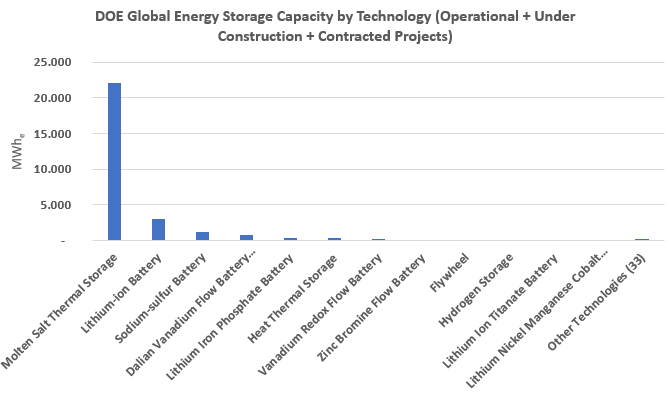Despite the continuously falling costs of solar and wind power, renewable energy continues to grapple with the issue of storing energy produced from sun and wind when the sun doesn’t shine and the wind doesn’t blow.

Lithium batteries store energy from the sun to provide it when needed, even if the sun doesn’t shine. But what if there were a solar power system coupled with a thermal battery capable of producing electricity at night by powering a turbine with stored heat?
Researchers from Curtin University in Australia are developing a prototype of a thermal battery capable of producing electricity overnight. This innovative approach to thermal battery development could be a viable source of 24/7 power for energy-intensive industries, including mining operations, potentially rivaling fossil fuel-generated power from coal, oil, or natural gas, Curtin University said in a statement this week.
Researchers at the university are collaborating with renewable energy companies United Sun Systems and ITP Thermal on this project. The thermal battery prototype was part of the Concentrated Solar Power (CSP) system developed by United Sun Systems, which requires a battery to store and release energy to enable non-stop solar power generation, said Professor Craig Buckley from Curtin’s School of Electrical Engineering, Computing and Mathematical Sciences, who leads the project.
‘The battery uses a high-temperature metal hydride or metal carbonate as the heat storage medium and a low temperature gas storage vessel for storing the hydrogen or carbon dioxide,’ Professor Buckley says.
‘At night, and in times of cloud cover, hydrogen or carbon dioxide is released from the gas storage vessel and absorbed by the higher temperature metal to form a metal hydride/metal carbonate, which produces heat used to generate electricity,’ according to Buckley.
The goal of Curtin University’s researchers is to develop new technology to integrate the thermo-chemical energy storage into a dish-Stirling system via a thermal battery.
According to the Curtin University scientists, this system could provide up to 46 kW of power and would be ideal to power remote heavy industries such as mining sites because it could provide power on demand.
The research project targeted to develop a solar power system capable of producing electricity 24/7 and viable for industrial operations, according to Curtin University Deputy Vice-Chancellor Research Professor Chris Moran.
‘While a lithium battery stores electrical energy that can be used to provide electricity when the sun is not shining, this thermal battery stores heat from concentrated solar thermal, which can be used when the sun is not shining to run a turbine to produce electricity,’ Professor Moran says.
‘As with the lithium battery systems that Curtin is also developing, the deployment of a cost-effective energy storage system using thermal batteries will revolutionise the landscape of renewable energy production world-wide by allowing renewables to truly compete with fossil fuels,’ Professor Moran noted.
Renewables are already competing with fossil fuels in some regions, according to BloombergNEF’s New Energy Outlook 2019. Wind and solar power are now cheapest across more than two-thirds of the world and are expected to undercut commissioned coal and gas almost everywhere by 2030, BNEF said in its outlook last month. Wind and solar are expected to account for nearly 50 percent of the global electricity mix by 2050, according to BNEF.
Time will tell if the 24/7 solar power generation system that Australian researchers are developing could turn out to be a game-changer in renewable energy and a threat to fossil fuels in powering heavy industries.